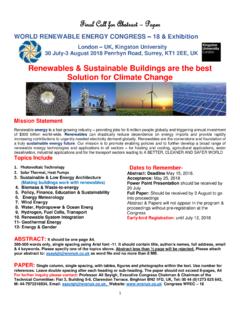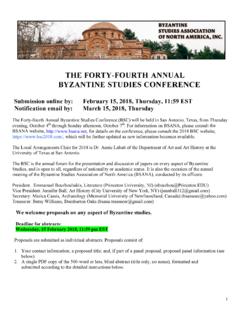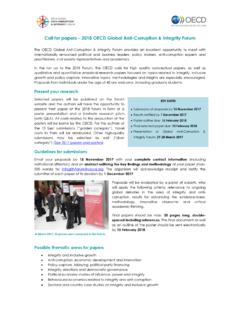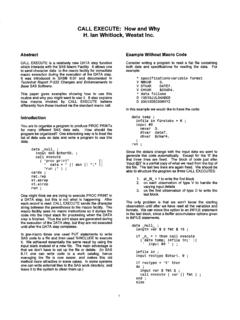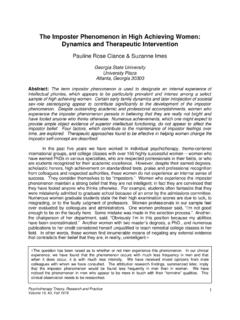Transcription of 2018 Call for Papers - Population Association of America
1 2018 call for Papers Annual Meeting, Population Association of America Denver, CO April 26 April 28, 2018 Deadline for Submissions: September 29, 2017 Before Submitting a paper or Poster, Please Note the Following: Being accepted to present in an oral or poster session, and then cancelling close to the start of the meeting or not showing up prevents others from having the opportunity to present their work. After you are selected to present at the annual meeting, you will be sent a request to pre-register for the meeting, which will confirm your participation in the meeting. Schedule requests will not be considered, so when making travel arrangements, plan to attend the entire conference. PAA s two-presenter rule (detailed below) allows an individual to present only twice (four total appearances), and only those two presentations are considered for scheduling purposes. Because of the sheer volume of co-authors, we cannot consider conflicts of a non-presenting author when setting the conference session schedule.
2 If you make changes to the presenting author after the schedule has been set, please keep this in mind. Organizers will not review Papers from close collaborators or current students. Travel awards are very limited, so please do not submit a paper if travel to the conference is based solely on the possibility of receiving a travel award. Instructions for Submitting a paper 1. All presenters, discussants, chairs and session organizers must be registered for the meeting to participate. All presenting authors must pre-register for the conference by January 28 to confirm presentation. Members receive a preferred rate for annual meeting registration, and all participants are strongly encouraged to join. Learn more about PAA membership online. 2. Submissions are made online at the 2018 Annual Meeting submission website, Online submissions will open on July 24, 2017. The submission process is similar to past years.
3 Authors are asked to submit both: a) a short abstract (150 words) to be entered online; and b) either an extended abstract (2-4 pages, including tables) or a completed paper to be uploaded to the website following instructions available online. Authors also are asked to identify who will present the paper (see below on the two-presenter rule adopted by PAA). Authors may modify their submissions online at any time until September 29, 2017. 3. Extended abstracts must be sufficiently detailed to allow the session organizer to judge the merits of the paper , including a description of the topic to be studied, the theoretical focus, the data and research methods, and the expected findings. Alternatively, authors may submit completed Papers for the organizer to review. If your submission is accepted in a regular session, you must upload the full paper by April 6, 2018. 4. The PAA 2018 submission website will allow session organizers to view the titles and authors of submitted abstracts as they are received online.
4 The author making the submission must provide the full name, affiliation, country and email address of each coauthor for each submission. 5. The author submitting the abstract must also identify the person who will present the paper . There will be an opportunity to change who the presenter is before the program is finalized (see below on PAA s two-presenter rule). 6. As in the past, all sessions are numbered. If you wish to have your abstract considered by two organizers, you must indicate the session numbers of your first and second choices on the online submission form. This gives the first designated organizer first right of acceptance. No paper /abstract may be submitted to more than two sessions. Authors submitting a paper to regular sessions may also have their paper considered for a poster session; see below for details. 7. In addition to the 130 sessions listed in this call for Papers , approximately 100 "overflow" sessions will be created at the request of session organizers who receive large numbers of submissions.
5 In choosing where to submit your paper , keep in mind that session organizers with broad session titles generally end up organizing at least two or three sessions. You should send your paper to the sessions that are closest to the topic of your paper . Instructions for Submitting a Poster 1. Members are encouraged to submit abstracts/ Papers for consideration as posters. All of the above instructions for abstract/ paper submissions also apply for poster submissions. Authors who wish to submit their Papers for consideration only for a poster session should submit their abstracts/ Papers to Session 1202. 2. An author who is submitting a paper to one or two regular sessions also may have the paper considered for a poster session if it is not accepted in a regular session. Authors who want their Papers considered for a poster session must check "yes" in the appropriate area of the online submission form. If you do not check yes, your paper will not be considered for a poster.
6 Two-Presenter Rule The PAA Board of Directors voted to adopt a two-presentations rule for the annual meeting. Each individual may serve as the presenter for only two Papers or posters (total), regardless of the number of Papers and posters on which the individual is an author or co-author. Single-authored Papers must be presented by the author. Each submission for inclusion on the program must indicate who will present the paper or poster. When all sessions are finalized (that is, all Papers and posters have been accepted or rejected), there will be a short time interval when presenter status can be revised so that no individual presents more than twice. Individuals may serve as chair and/or discussant in addition to making two presentations, providing the opportunity for individuals to have up to four appearances in all, counting across presenter, chair, and discussant roles. Important Dates July 24, 2017 Confex opens for submissions September 29, 2017 Deadline for submitting Papers or abstracts to organizers November 16, 2017 Deadline for submitting travel award applications to PAA November 27, 2017 Authors are notified of Papers accepted into regular sessions December 14, 207 Authors are notified of Papers accepted into overflow sessions December 18, 2017 Authors are notified of Papers accepted into poster sessions January 28, 2018 Deadline for presenting authors to preregister March 2, 2018 Deadline for making online revisions to abstracts of accepted paper April 6, 2018 Deadline for posting completed Papers on the program website If you have questions, please contact 3 PAA 2018 Sessions and Organizers Click here to visit the PAA2018 program website and view a list of the Program Committee members who developed this program.
7 1 Fertility, Family Planning, Sexual Behavior and Reproductive Health 101 Stalled, Reversed, and Unexpected Fertility Transitions and Trends Chimaraoke Izugbara Africa Population Health Research Center 102 Fertility in Developing Countries Monica Magadi University of Hull 103 Trends, Determinants, and Consequences of Unmet Need Jacob Adetunji USAID 104 Dynamics of Contraceptive Use in Developing Countries Megan Klein Hattori University of Massachusetts Boston 105 Contraceptive Behavior in Developed Countries Jonathan Marc Bearak Guttmacher Institute 106 Adolescent Sexual and Reproductive Health Rachel Goldberg University of California, Irvine 107 Spatial and Contextual Effects on Reproductive Health and Fertility Sebastian Klusener Max Planck Institute for Demographic Research 108 Reproductive Behavior and Sexual Health of Middle and Older Adults Nancy Luke Pennylsvania State University 109 Fertility Intentions: Causes and Consequences Heather Rackin Louisiana State University 110 Abortion Abigail Aiken University of Texas 111 Migration, Migrants, and Fertility Marta Alvira-Hammond Child Trends 112 Reproductive Behavior and Fertility.
8 Research on Couples Bryndl Hohmann-Marriott University of Otago 113 Measurement Innovations for Studying Reproductive Behaviors and Careers Cassandra J Dorius Iowa State University 4 114 The Union Context of Childbearing Christina Gibson-Davis Duke University 115 Men's Sexual Health and Fertility Gladys Martinez Centers for Disease Control and Prevention 116 Sexually Transmitted Infections, HIV, and Reproductive Health Giovanna Merli Duke University 117 Contemporary and Historical Fertility Transitions Francis Dodoo Pennylsvania State University 118 Fertility Timing and Spacing Karen Guzzo Bowling Green State University 119 Female Education, Employment, and Fertility Jessica Huston Su University at Buffalo, SUNY 120 Sexual Orientation, Gender Identity and Expression, and Reproductive Health Claire Kamp Dush Ohio State University 121 Low Fertility and Childlessness Gunnar Andersson Stockholm University 122 Fertility, Family Planning, and Sexual Health: Programs and Policies Karen Hardee Population Council 123 Sex Preferences and Sex Composition Effects on Fertility Nadia Diamond-Smith University of California, San Francisco 124 Race, Ethnic, and Social Class Differences in Reproductive Health and Fertility Megan Sweeney University of California, Los Angeles 125 Gender, Equity, and Reproductive Health Trude Lappegard University of Oslo 126 The Consequences of Fertility Timing and Context for the Subsequent Life Course Heidi Lyons Oakland University See also.
9 Sessions 302, 412, and 416 2 Marriage, Family, Household and Unions 201 Families, Health, and Well-being Hui Liue Michigan State University 5 202 Families and Inequality Molly Martin Pennylsvania State University 203 Families and Work Kei Nomaguchi Bowling Green State University 204 Family Demography: Methods and Projections Jonathan Vespa Census Bureau 205 Time Use in Families Carrie Shandra SUNY Stony Brook 206 Cohabitation and Other Nonmarital Relationships Maggie Thorsen Montana State 207 Union Formation Lauren McClain Western Kentucky 208 Union Dissolution Sheela Kennedy University of Michigan 209 Families, the Law, and Public Policy Benoit LePlante Institut National de la Recherche Scientifique 210 Families and Child and Adolescent Health Kristen Harknett University Pennylsvania 211 Fathers and Families Lenna Nepomnyaschy Rutgers University 212 Family Complexity and Diversity Shannon Cavanagh University of Texas 213 Same-Sex Unions and Family Life Corinne Reczek Ohio State University 214 Intergenerational Relationships Jennifer Bulanda Miami University (OH)
10 215 Interpersonal Relationships in Families Abigail Weitzman University of Texas 216 Gender and Families Lea Pessin Pennylsvania State University 217 Parental Well-being Laura Bernardi University of Lausanne 6 218 Families, Social Media, and Technology Heidi Lyons Oakland University See also: sessions 112, 114, 303, 305, 310, 404, 428, 501, 505, 608, and 704 3 Children and Youth 301 School and Peer Influences on Child Well-Being Clea McNeely University of Tennessee, Knoxville 302 Adolescent Risky Behaviors and Well-Being Callie Burt University of Washington 303 Family Diversity and Child Well-Being Sharon Bzostek Rutgers University 304 Transitions to Adulthood Monica Longmore Bowling Green State University 305 Child Wellbeing in the Era of Mass Incarceration Anna Haskins Cornell University 306 Neighborhood and Community Effects on Child Wellbeing Corina Graif Pennylsvania State University 307 The State, Social Policy, and Child Wellbeing Sarah Font Pennylsvania State University 308 Adverse Childhood Experiences and Resilience Kristin Moore Child Trends 309 Social Contexts (Race/Ethnicity, SES, Sexual Identity)
